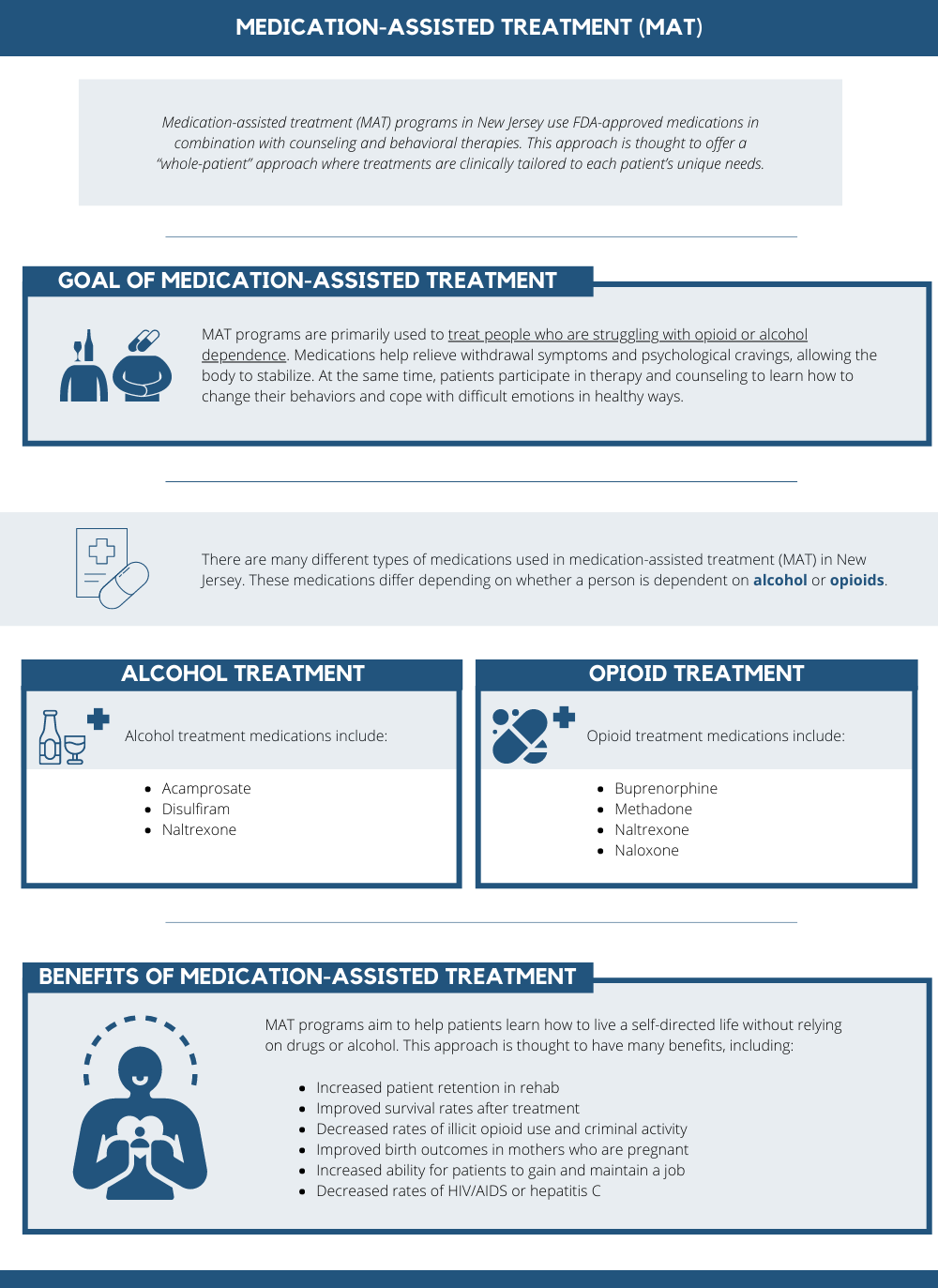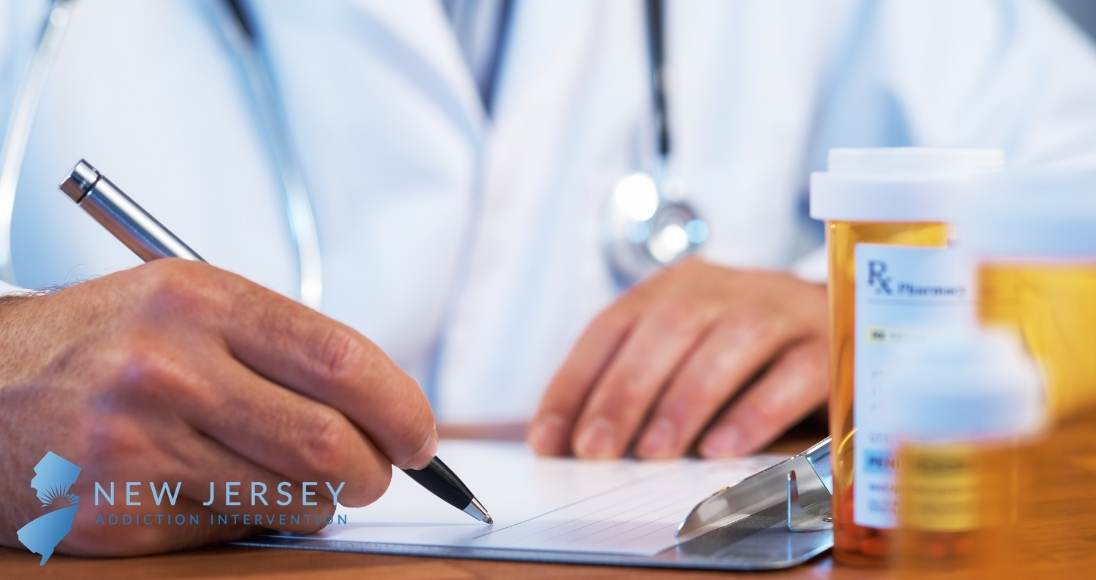Since the late 1980s, rates of opioid abuse and addiction have continued to skyrocket in the United States. Opioid addiction has recently become a public health crisis that mental and behavioral health professionals have been keeping a close eye on. While traditional treatment methods involving therapy and intensive counseling can help many people stay sober, even more people can benefit from a careful approach combining medications with behavioral therapy and counseling. This approach is better known as medication-assisted treatment (MAT).
Medication-assisted treatment (MAT) programs in New Jersey offer to extend help to those who have been beaten down by their addiction to opioids and alcohol. While medications take care of the physical symptoms of addiction, therapy and counseling take care of the rest.

What is Medication-Assisted Treatment (MAT)?
Medication-assisted treatment (MAT) programs in New Jersey use FDA-approved medications in combination with counseling and behavioral therapies. This approach is thought to offer a “whole-patient” approach where treatments are clinically tailored to each patient’s unique needs.[1]
MAT programs are primarily used to treat people who are struggling with opioid or alcohol dependence. Medications help relieve withdrawal symptoms and psychological cravings, allowing the body to stabilize. At the same time, patients participate in therapy and counseling to learn how to change their behaviors and cope with difficult emotions in healthy ways.
There are many different types of medications used in medication-assisted treatment (MAT) in New Jersey. These medications differ depending on whether a person is dependent on alcohol or opioids.
Alcohol treatment medications include:
- Acamprosate
- Disulfiram
- Naltrexone
Opioid treatment medications include:
- Buprenorphine
- Methadone
- Naltrexone
- Naloxone
Efficacy and Benefits of MAT
According to SAMHSA, more than 2 million people struggled with an opioid use disorder in 2018.[2] Even though only a small percentage of drug users seek treatment, MAT programs have proven themselves to be one of the most effective treatment approaches available. MAT provides patients with a comprehensive and individualized program of medication and therapy that is able to successfully meet any patient’s needs.
MAT programs aim to help patients learn how to live a self-directed life without relying on drugs or alcohol. This approach is thought to have many benefits, including:
- Increased patient retention in rehab
- Improved survival rates after treatment
- Decreased rates of illicit opioid use and criminal activity
- Improved birth outcomes in mothers who are pregnant
- Increased ability for patients to gain and maintain a job
- Decreased rates of HIV/AIDS or hepatitis C
When MAT medications are combined with therapy and peer support, research has proven that they can help patients sustain long-term recovery.
Individualized Counseling
Federal law 42.CFR 8.12 mandates that MAT patients who are receiving treatment for opioid or alcohol abuse must also receive counseling and various forms of behavioral therapy.[1] These services, more often than not, are combined with vocational, educational, and medical treatment services. This approach is clinically driven, so each therapeutic service can be customized to meet a patient’s specific needs.
For example, if a person suffering from opioid addiction also struggles with depression or another mental illness, he or she will need treatment for both addiction and depression. On the other hand, if a patient has a history of trauma, he or she may need PTSD therapy and additional medications. The good part about medication-assisted treatment (MAT) in New Jersey is that everyone’s treatment experience is unique depending on their specific needs.
A few examples of ideas therapist’s take into consideration to provide a personalized treatment include:
- Age, race, gender, culture, and ethnic background
- Which substance was abused and for how long
- Family issues
- Social or relationship challenges
- Lifestyle choices
- Past experience with addiction treatment
This highly individualized approach is known to produce better treatment results.
Evidence-Based Therapies
Medications are just one piece of the puzzle when it comes to MAT programs. Most MAT programs provide a slew of evidence-based therapies to help patients relax, develop self-awareness, and prevent relapse.[3] Examples of therapies patients may participate in include:
- Group therapy
- Individual counseling
- Cognitive-behavioral therapy (CBT)
- Dialectical behavioral therapy (DBT)
- Motivational interviewing (MI)
- Contingency management
- Holistic therapies (art, yoga, dance, meditation, music, etc.)
- PTSD/trauma therapy
- Dual diagnosis therapy
- The Matrix Model
- Biofeedback/Neurofeedback
- Family systems therapy
Regardless if MAT is provided in an inpatient or outpatient setting, treatment medications are always more effective when combined with behavioral therapies or counseling.
Find a Medication-Assisted Treatment (MAT) Program in New Jersey Today
Today, MAT remains the gold standard in addiction treatment, particularly for those who have struggled with opioid or alcohol abuse.[4] When combined with individualized treatment, MAT medications can help patients stay sober, avoid relapsing behaviors, and keep patients in treatment.
If you or a loved one are addicted to alcohol or opioids, medication-assisted treatment (MAT) in New Jersey may be right for you. To learn more about our treatment programs or to find a rehab center in your area, pick up the phone and speak with one of our dedicated addiction professionals today.
References:
Medically Reviewed: April 27, 2021

All of the information on this page has been reviewed and verified by a certified addiction professional.

